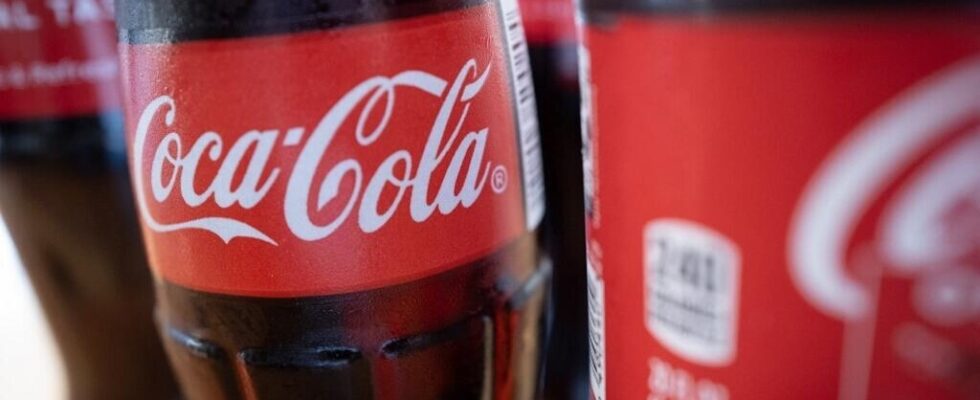The partnership between Coca-Cola and the 2024 Olympic Games, already criticized on ecological grounds, was the subject of attacks on Wednesday August 7 by public health specialists, who accuse the American giant of “sportswashing”.
5 min
The partnership between Coca-Cola and the JO 2024already criticized on an ecological level, was the subject of attacks on Wednesday August 7 from public health specialists, who accuse the American giant of “sportswashing”.
In the review BMJ Global Healthtwo researchers Trish Cotter and Sandra Mullin have stepped up to denounce the partnership between the Coca-Cola company and the International Olympic Committee (IOC). By continuing to partner with Coca-Cola, the Olympic movement risks being complicit in worsening a global epidemic of poor nutrition, environmental degradation and climate change. “, they write. Coca-Cola is one of the oldest sponsors of the Olympic Games, which it has sponsored since the 1928 edition.
Low or no nutritional interest
The article of the BMJ Global Health He emphasizes health issues, pointing out that Coca-Cola sells sugary drinks. with little or no nutritional interest “. Sodas are “ one of the main drivers ” of widespread pathologies throughout the world such as obesity or diabetes, underline the authors, who call on the IOC to break its ties with Coca-Cola. Beyond the Olympic Games, the article of the BMJ Global Health highlights Coca-Cola’s particularly important place in sports partnerships. No other group has as many, including companies with a sports-related activity, such as Nike. This strategy allows Coca-Cola to “sportwash” (a term coined on the model of “greenwashing”) unhealthy products, according to researchers from the international health organization Vital Strategies.
Asked this Wednesday during its daily press conference during the Paris Olympics, the IOC said: incredibly proud » of the century-old partnership with the brand. In Paris, « They provide a full range of products: water, tea, coffee, juices, soft drinks. So there are plenty of sugar-free options ” said Anne-Sophie Voumard, director of marketing and television services.
Sports Minister Amélie Oudéa-Castéra had already been criticized at the end of 2023, notably by doctors, for having published photos of herself with representatives of Coca-Cola. She had acknowledged an unfortunate choice in terms of image, rejecting any complacency with the group.
Heavy use of plastic containers
Concerning the current edition in Paris, the American soda giant has already been called into question once for its intensive use of plastic containers. Returnable plastic cups filled by single-use plastic bottles : on many Olympic sites, the sponsor of the 2024 Olympic Games Coca-Cola uses this material of which it is a huge emitter, according to it because of ” technical and logistical constraints “.
In the tennis den at Roland-Garros, in the boxing den at Villepinte (Seine-Saint-Denis), for the basketball quarter-finals at Bercy on Tuesday 7 August, the scene is repeated: plastic bottles filled with Fanta, Sprite or Coca-Cola, the only ones that can be sold in the Olympic venues, are emptied into two-euro returnable cups. The bottles are immediately thrown into sorting bags at the foot of the sales kiosks.
At the end of June, environmental protection associations such as the France Nature Environnement (FNE) network had criticised a ” unjustified plastic pollution ” from one of the world’s largest users of plastic. Even if the bottles are sorted for recycling, they have an impact on the planet, because of the production (often from oil), the transport and the energy consumed for recycling, while the use of fountains, like in fast food restaurants, would have required much less material.
These containers are at the heart of Coca-Cola’s business model: in its financial documentation, the group indicates that it produced in 2022 (the latest year available) approximately 134 billion plastic bottles, or 4,250 every second; however, in many countries, recycling is lacking and the bottles end up in landfills or in the environment.
Global treaty against plastic pollution in the pipeline
The American giant, which adopted the plastic bottle in 1978, explained in a press release on Friday that it was necessary to find the ” better food safety and quality conditions “, but also “ adapt to each site and its technical and logistical constraints “, citing among these the arrivals of water and electricity, the ” available surface “, or the ” storage space “He assures that nearly 10 million drinks, or ” more than half ” of all those served to the general public, will be ” without single-use plastic ” Coca-Cola also assures that approximately 6.2 million drinks are served in bottles “made mostly of recycled PET plastic”. It aims for “all bottle bodies across all formats to be made of fully recycled plastic” by 2030. The group finally argues that recovering bottles upon service helps ensure ” that they are sorted and compacted in order to be recycled “.
Reducing the use of single-use bottles is at the heart of the standoff between 175 countries trying to finalize the first global treaty against plastic pollution this year: manufacturers and their countries refuse any reduction in production and affirm that recycling will prevent plastics from ending up in the ocean.
Financially, the year is good for Coca-Cola, with a better-than-expected second quarter of 2024 and raised financial targets. On the other hand, it is the subject of a very significant tax adjustment in the United States of at least six billion dollars. The soda giant, some of whose subsidiaries are also in the sights of the French tax authorities, has indicated that it will appeal.
Read alsoFollow the 2024 Olympic Games on RFI
